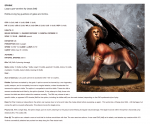By an "exception-based" ability, I'm referring to a power or ability that a creature might have that cannot be modelled normally by the standard creature-building rules structure. You have to make an exception to the rules. Older D&D editions were very exception-based; 4E was in terms of monster design. 3.x less so, more focused on a strong structure for monster building (though it does include exception-based stuff too).
I enjoy both approaches for different reasons. Below is an example of an exception-based ability for my WOIN game. This sphinx is built normally using the monster creation rules and maths, but it's "Riddles" ability is completely exception based. Not only that, it's absolute - it's not dependent on character power; you can't bypass it or overcome it except in the specific way stated.
How do you feel about this exception-based stuff? Do you prefer everything modelled by a predefined set of 'physics' in your game, or do you enjoy some absolute outside wonkiness like this?
What games, out of curiosity, are the least exception based? The ones where a critter is completely modelled by building rules to exact detail?

I enjoy both approaches for different reasons. Below is an example of an exception-based ability for my WOIN game. This sphinx is built normally using the monster creation rules and maths, but it's "Riddles" ability is completely exception based. Not only that, it's absolute - it's not dependent on character power; you can't bypass it or overcome it except in the specific way stated.
How do you feel about this exception-based stuff? Do you prefer everything modelled by a predefined set of 'physics' in your game, or do you enjoy some absolute outside wonkiness like this?
What games, out of curiosity, are the least exception based? The ones where a critter is completely modelled by building rules to exact detail?



